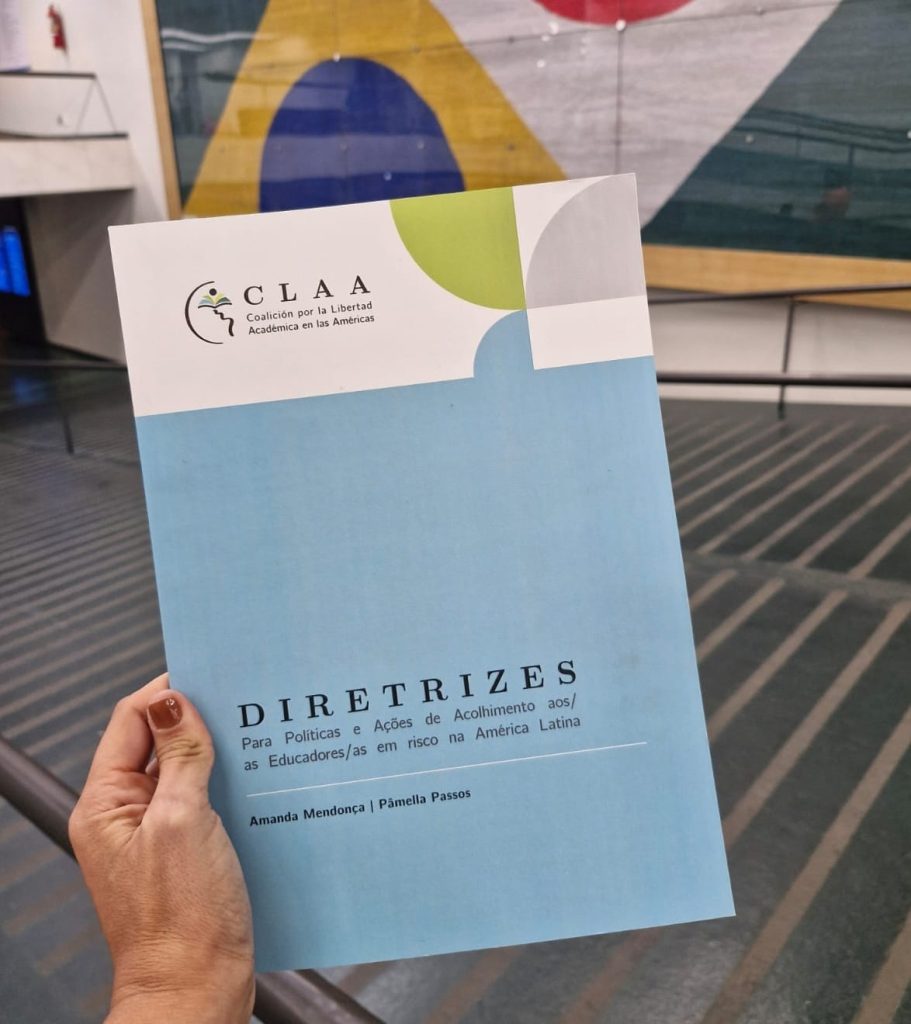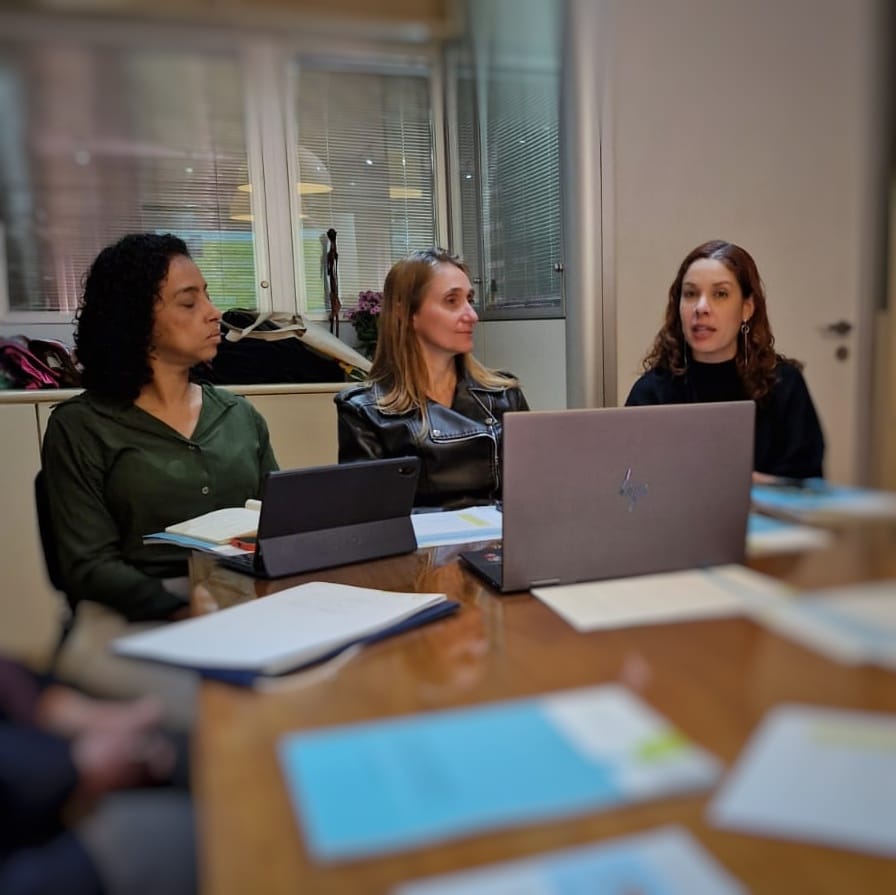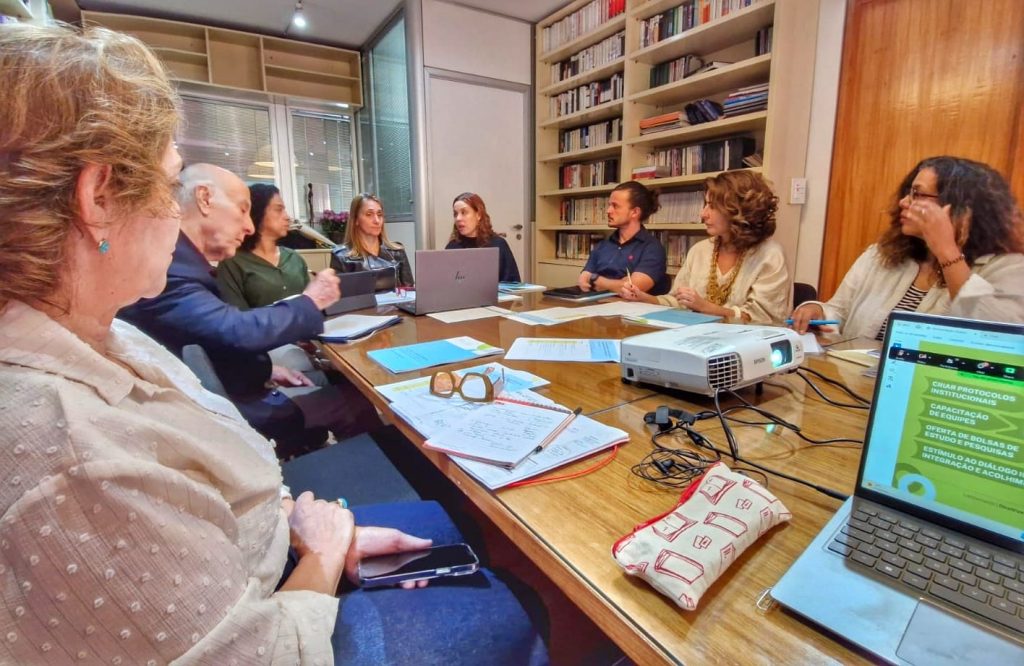The Coalition for Academic Freedom in the Americas (CAFA) has released a document that guides universities and educational institutions in creating welcoming policies, contributing to the strengthening of academic freedom in Latin America
The opening of the event to launch the Guidelines for Policies and Actions to Welcome Educators at Risk in Latin America was led by Camilla Croso, executive director of the Coalition for Academic Freedom in the Americas (CAFA). The session took place at the National Confederation of Education Workers (CNTE) in Brasilia and featured authorities and leaders among its panelists, as well as participants from various parts of the American continent.
In her opening remarks, Camilla Croso highlighted the relevance of the guidelines as a milestone for the Coalition and for the region. She recalled that CAFA was created in 2021, the same year that the Inter-American Principles on Academic Freedom and University Autonomy were approved, and emphasized that the launch of this new document represents an important step in bringing to the forefront a topic that has been little debated and visible: the need to welcome, within the Latin American region itself, educators who face censorship, persecution, and attacks as a result of their pedagogical and academic activities.
“The guidelines aim to guide educational institutions and national and regional authorities in the formulation, implementation, and monitoring of policies and actions aimed at welcoming educators at risk. This is an initiative that seeks to strengthen academic freedom, contribute to overcoming barriers, and create a welcoming ecosystem based on the ethics of care, both at the institutional and regional levels,” said Camilla Croso.



From left to right: detail of the newly released document; 2. Pâmella Passos, Camilla Croso and Amanda Mendonça during the presentation of the guidelines; 3. Participants during the event, held at the CNTE headquarters.
Educators at the center of the welcoming process
During the launch, the authors of the document, Amanda Mendonça, adjunct professor at the Faculty of Teacher Training at the State University of Rio de Janeiro (FFP/UERJ), and Pâmella Passos, professor at the Federal Institute of Education, Science, and Technology of Rio de Janeiro (IFRJ), emphasized that situations of persecution of educators and restrictions on academic freedom, although specific to each country, reflect a common trend throughout Latin America. “The regional context has been marked not only by the precarious nature of teaching work, but also by threats to pedagogical autonomy and the freedom to teach, learn, and research,” said Amanda Mendonça, who continues: “This increasingly recurring reality requires coordinated responses and concrete policies to welcome and protect educators at risk throughout the region.”
Beyond the goal of offering practical guidance to educational institutions in the formulation, implementation, and monitoring of policies aimed at protecting educators, Pâmella Passos explains that the guidelines are of fundamental importance in “placing educators themselves at the center of welcoming actions, ensuring that those who face situations of persecution or attacks do not feel isolated or helpless.” She emphasizes that the meaning of these guidelines goes beyond the normative dimension: “it is about promoting a network of solidarity and mutual support, ensuring that no one is alone in the face of violations of academic freedom.”
Academic freedom: support for victims is the best way forward
In addition to Camilla Croso, Pâmella Passos, and Amanda Mendonça, the event was attended by Fátima Silva, secretary general of the National Confederation of Education Workers (CNTE); Sandra Goulart Almeida, dean of the Federal University of Minas Gerais (UFMG) and president of the Latin American and Caribbean Higher Education Space (ENLACES); Brazilian Senator Teresa Leitão; Andrés Cambronero, coordinator of Casa DEI, Costa Rica; Andressa Caldas, director of the Institute for Public Policy on Human Rights (IPPDH); and María Luisa Rodríguez Peñaranda, professor at the National University of Colombia (UNAL).
During her speech, María Luisa emphasized that the Guidelines for Policies and Actions to Welcome Educators at Risk in Latin America are inspiring for the entire region, seeking not only to guide, but also to motivate, sensitize, and convince educational institutions that supporting victims is the best path—and not acting against them. “It is necessary to break with the false pretense of neutrality that still marks many Latin American universities in situations of violence and persecution, remembering that these institutions have clear international commitments, supported by instruments such as the Belém do Pará Convention and other regional human rights frameworks.”
She called on universities to recognize that violence and persecution—including gender-based violence—are not individual problems, but structural issues that require institutional action. “The guidelines seek to call on universities to understand their active role in eradicating this violence, positioning themselves as central actors in overcoming the problem, and not just as external observers.”
Care and support for educators
In his presentation, Andrés Cambronero spoke about the importance of care, understood not only as a theoretical concept, but as a human and relational practice that involves tact, listening, words, gestures, and time. “It is important to recognize the needs of the people being supported, respecting their time and contexts, and to humanize the bonds, starting from the vulnerability of those who provide support,” he said.
For him, the psychosocial approach appears as a central element of the guidelines, as it allows for a comprehensive and contextualized understanding of the phenomena that affect educators—such as persecution—going beyond the individual dimension. “There is no ready-made recipe for welcoming and accompanying victims, as each person is unique. This work must take place in a safe, welcoming, and respectful environment, both in individual and collective spaces,” he explained.
University autonomy as a guarantee of democracy
In her presentation, the dean of UFMG and president of Enlaces, Sandra Goulart Almeida, acknowledged the importance of the document. She recounted her experience a few years ago when she was vice-rector of UFMG and suffered political persecution when she was “coercively taken away with the rector in 2017, after the opening of an exhibition at the Amnesty Memorial.”
She emphasized the need to continually talk about academic freedom, university autonomy, and democracy. “Defending and welcoming educators is also defending democracy,” she said.
Horizonte: welcoming as public policy
In her participation, Andressa Caldas highlighted that the Guidelines are not just a theoretical document, but a practical and applied instrument, the result of situated research and concrete experience of the authors and educators who have faced human rights violations. “The document seeks to translate international diagnoses and standards into clear and accessible guidelines that can be effectively used by educational institutions and public managers, strengthening the implementation of welcoming and protection policies,” she said.
For her, it is necessary to advance in the implementation of the guidelines and the formulation of public policies, based on political dialogue, including with parliamentarians and institutional actors, ensuring that the document translates into concrete actions for protection and reception throughout the region.
Brazilian Senator Teresa Leitão also highlighted the importance of the actions and recommendations presented in the document for consolidation, not only as specific initiatives, but as institutional policies and programs adopted by both governments and organizations.
“It is necessary to understand the subjective and human nature of these policies, which must recognize and value teachers in their entirety—as people who care, welcome, and relate to others,” she explains. For her, care, empathy, and affection should be seen as central elements of pedagogical practice. “I am available to support the guidelines in the parliamentary sphere for possible legislative initiatives derived from these proposals,” she said.
The launch event for the Guidelines is part of the celebrations for the 25th anniversary of Scholars at Risk (SAR), one of the founding entities of CAFA, recognized for its work in protecting and welcoming educators at risk around the world.
Letter of commitment: for the implementation of shelter guidelines in higher education institutions
Since the launch of the Guidelines, CAFA has presented higher education institutions with a letter of commitment with the aim of gathering signatures so that these guidelines can be implemented. The document has already gathered signatures from more than 30 institutions.
If your institution would like to sign this document, please contact the director of CAFA by email at camilla.croso@cafa-claa.org.
Learn more:
- Guidelines for Policies and Actions to Support Educators at Risk in Latin America – full document
- Guidelines for Policies and Actions to Support Educators at Risk in Latin America – full document – Spanish version
- Guidelines for Policies and Actions to Support Educators at Risk in Latin America – full document – Portuguese version
- Letter of Commitment – Portuguese version
- Letter of Commitment – Spanish version
Watch the recording of the Launch of the Guidelines for Policies and Actions to Support Educators at Risk in Latin America
